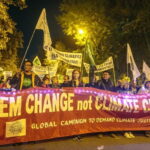Developed by Indigenous peoples centuries ago, it was only recently that the bioeconomy’s role in mitigating climate change and protecting biodiversity has gained momentum. Currently valued at $4 trillion globally, the bioeconomy is expected to reach $38.5 trillion by 2050. In the Pan-Amazon, home to more than 400 Indigenous peoples and the world’s largest river basin — but also to poverty and hunger levels above national averages and escalating violence — the bioeconomy represents a promising solution. “It offers livable alternatives to increasingly prevalent illicit activities and reduces the pressure of threats from loggers, miners and farmers,” Joaquin Carrizosa, strategic adviser to the Secretariat of the Pan-Amazon Network for Bioeconomy, told Mongabay. In September 2024, it secured a new, high-profile ally: the G20 group of the world’s biggest conventional economies. The G20 Initiative on Bioeconomy (GIB), which lists 10 voluntary high-level principles, is the first multilateral agreement to address the subject, according to the Brazilian government, which held the rotating G20 presidency at the time. Delegates at the inaugural GIB meeting. Image courtesy of Felipe Werneck/Brazilian Ministry of Environment and Climate Change. The GIB proposes international collaboration for sustainable development, and that the bioeconomy be inclusive and equitable. For experts like Luiz Brasi Filho, market coordinator at Rede Origens Brasil, a network that connects Amazon producers with companies and consumers, it was a symbolic achievement. “The common understanding reached by the GIB is a crucial step to level the field and direct national and international investments,” he told Mongabay. Yet,…This article was originally published on Mongabay
Search
Recent Research
Want your Blog Article featured on our website?
Research
Featured News
How to Make Your Home More Energy-Efficient in 2026
A practical, future-ready guide for lower bills and a smaller footprint Rising energy prices and
Sustainable Break Rooms: Greening the Office Pantry
Photo by Rodeo Project Management Software on Unsplash A break room may seem like a
Solar-powered AI streetlights to fund coastal highway construction
Nigeria’s long delayed Lagos-Calabar Coastal Highway is set to be rescued by thousands of AI-driven,
Big Data Analytics Enhances Renewable Energy sector
The sun doesn’t send bills, but energy companies using renewable energy do. And to keep
From COP30 to Sri Lanka, indigenous voices shape climate & food sovereignty
COLOMBO — When Indigenous groups converged at the entrance of the U.N. Climate Change Conference
Another threat to reefs: Microplastic chemicals may harm coral reproduction
As the sliver of a new moon shines over Kāneʻohe Bay, Oʻahu, millions of tiny
A Practical Guide to Choosing the Right Organizer Bins Online
Choosing organizer bins sounds simple — until you start comparing sizes, materials, and specs online.
How Lagos traders struggle as styrofoam gradually disappears in markets
Traders have continued to count their losses about five months after the Lagos State Government





